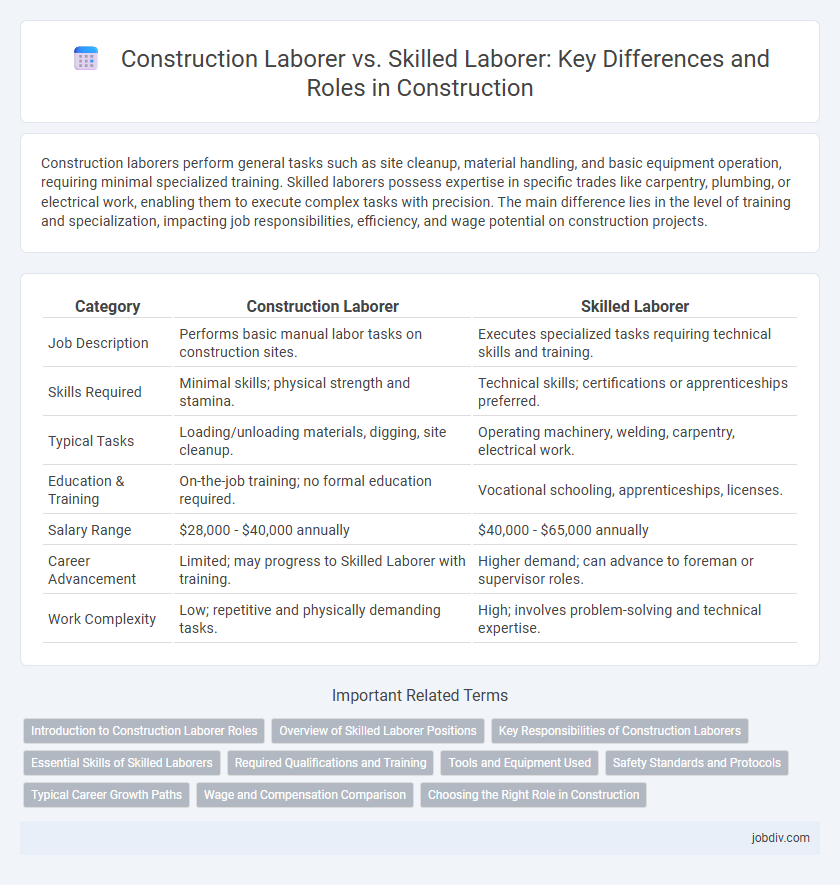Construction laborers perform general tasks such as site cleanup, material handling, and basic equipment operation, requiring minimal specialized training. Skilled laborers possess expertise in specific trades like carpentry, plumbing, or electrical work, enabling them to execute complex tasks with precision. The main difference lies in the level of training and specialization, impacting job responsibilities, efficiency, and wage potential on construction projects.
Table of Comparison
| Category | Construction Laborer | Skilled Laborer |
|---|---|---|
| Job Description | Performs basic manual labor tasks on construction sites. | Executes specialized tasks requiring technical skills and training. |
| Skills Required | Minimal skills; physical strength and stamina. | Technical skills; certifications or apprenticeships preferred. |
| Typical Tasks | Loading/unloading materials, digging, site cleanup. | Operating machinery, welding, carpentry, electrical work. |
| Education & Training | On-the-job training; no formal education required. | Vocational schooling, apprenticeships, licenses. |
| Salary Range | $28,000 - $40,000 annually | $40,000 - $65,000 annually |
| Career Advancement | Limited; may progress to Skilled Laborer with training. | Higher demand; can advance to foreman or supervisor roles. |
| Work Complexity | Low; repetitive and physically demanding tasks. | High; involves problem-solving and technical expertise. |
Introduction to Construction Laborer Roles
Construction laborers handle fundamental physical tasks such as site preparation, material loading, and equipment operation, requiring minimal specialized skills. Skilled laborers possess expertise in specific trades like carpentry, plumbing, or electrical work, enabling them to perform complex and technical activities vital to project success. Both roles are essential for efficient construction workflows, with laborers supporting skilled tradespeople to enhance productivity and safety on-site.
Overview of Skilled Laborer Positions
Skilled laborer positions in construction include electricians, plumbers, carpenters, and welders who possess specialized training and certification to perform complex tasks. These roles require proficiency in reading blueprints, operating machinery, and adhering to safety regulations to ensure high-quality workmanship. Skilled laborers contribute to project efficiency and structural integrity by applying technical knowledge and hands-on expertise.
Key Responsibilities of Construction Laborers
Construction laborers are responsible for a wide range of physically demanding tasks including loading and unloading materials, operating basic machinery, and preparing job sites by clearing debris and setting up scaffolding. They assist skilled laborers and tradespeople by holding tools, mixing cement, digging trenches, and ensuring the work area remains safe and organized. Their role is essential for maintaining workflow efficiency and supporting specialized construction activities on-site.
Essential Skills of Skilled Laborers
Skilled laborers in construction possess essential skills such as proficiency in operating specialized tools and machinery, advanced knowledge of building materials, and the ability to read blueprints accurately. Their expertise ensures precise execution of tasks like carpentry, masonry, and electrical work, which require technical training and certification. Mastery of safety protocols and problem-solving abilities further distinguishes skilled laborers from general construction laborers.
Required Qualifications and Training
Construction laborers typically require basic physical fitness and on-the-job training for tasks such as site preparation and material handling, while skilled laborers must complete specialized training or apprenticeships in trades like carpentry, plumbing, or electrical work. Skilled laborers often possess certifications or licenses that demonstrate proficiency in their craft, ensuring compliance with safety standards and technical requirements. The distinction in qualifications directly impacts project complexity, with skilled laborers handling precise, technical tasks and unskilled laborers supporting general construction activities.
Tools and Equipment Used
Construction laborers primarily handle basic tools such as shovels, hammers, and wheelbarrows to perform physical tasks like digging, lifting, and loading materials. Skilled laborers operate specialized equipment including power tools, welding machines, and heavy machinery like forklifts and cranes, requiring advanced training and certification. The distinction in tools and equipment reflects the complexity and technical expertise needed for skilled labor compared to general labor tasks.
Safety Standards and Protocols
Construction laborers and skilled laborers follow distinct safety standards and protocols tailored to their job responsibilities and exposure risks. General construction laborers adhere to OSHA guidelines for basic hazards such as manual material handling and equipment operation, while skilled laborers are required to implement advanced safety measures related to their specialized trades, including electrical, welding, or heavy machinery operation. Compliance with site-specific safety training, use of personal protective equipment (PPE), and participation in hazard communication programs remain critical for both categories to prevent workplace injuries and maintain regulatory compliance on construction sites.
Typical Career Growth Paths
Construction laborers typically start with basic tasks such as site preparation and material handling, progressing through hands-on experience to roles like equipment operators or foremen. Skilled laborers, possessing specialized trade skills--such as electricians, plumbers, or carpenters--often advance to supervisory positions, project managers, or independent contractors. Career growth in both paths relies heavily on certifications, apprenticeships, and continuous skill development within the construction industry.
Wage and Compensation Comparison
Construction laborers typically earn a median hourly wage of $17 to $22, while skilled laborers, such as electricians or carpenters, command higher wages ranging from $25 to $35 per hour due to specialized training and certifications. Compensation packages for skilled laborers often include benefits like health insurance, retirement plans, and performance bonuses, reflecting their advanced skill set and industry demand. Wage disparities highlight the premium placed on expertise and technical proficiency within the construction sector.
Choosing the Right Role in Construction
Choosing the right role in construction hinges on evaluating the specific skills and experience of laborers versus skilled laborers, as skilled laborers typically possess specialized training in tasks such as carpentry, welding, or electrical work that demand precision and safety compliance. Construction laborers handle general duties like site preparation, material transport, and basic equipment operation, making them essential for foundational support but less suited for complex tasks requiring certifications or technical expertise. Prioritizing project requirements, budget constraints, and safety standards ensures optimal role assignment, enhancing efficiency and reducing risks on construction sites.
Construction Laborer vs Skilled Laborer Infographic

 jobdiv.com
jobdiv.com